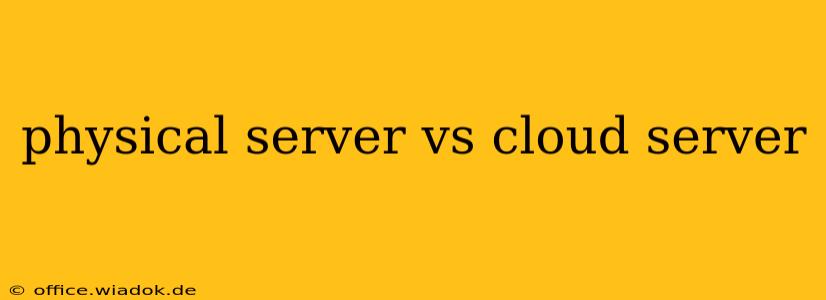The decision between a physical server and a cloud server is a crucial one for businesses of all sizes. Understanding the key differences between these two infrastructure options is paramount to making an informed choice that aligns with your specific needs, budget, and long-term goals. This comprehensive guide will delve into the intricacies of each, highlighting their advantages and disadvantages to help you navigate this critical decision.
What is a Physical Server?
A physical server is a self-contained computer system residing in a physical location, typically within your own data center or a colocation facility. You own the hardware, responsible for its maintenance, security, and upkeep. This includes purchasing, installing, configuring, and managing the server, along with all associated infrastructure like power, cooling, and network connectivity.
Advantages of Physical Servers:
- Complete Control: You have absolute control over your hardware and software, offering maximum customization and flexibility.
- High Security: For applications requiring stringent security, a physical server offers greater control over security measures, especially when combined with robust on-premise security protocols.
- Predictable Performance: With dedicated resources, you can anticipate consistent performance, free from the potential fluctuations of shared resources in a cloud environment.
- Compliance: Physical servers may be necessary to meet specific industry compliance regulations requiring absolute control over data storage and processing.
Disadvantages of Physical Servers:
- High Upfront Costs: The initial investment in hardware, setup, and ongoing maintenance can be substantial.
- Limited Scalability: Scaling resources requires purchasing additional hardware, a time-consuming and potentially costly process.
- Maintenance Overhead: You are responsible for all maintenance, including hardware repairs, software updates, and system backups.
- Location Dependency: Access is limited to the physical location of the server.
What is a Cloud Server?
A cloud server, also known as a virtual server or virtual machine (VM), is a virtualized computing resource provided by a third-party cloud provider. Your data and applications reside on a provider's physical hardware, but you access and manage them remotely through a web interface or API. Popular cloud providers include Amazon Web Services (AWS), Microsoft Azure, and Google Cloud Platform (GCP).
Advantages of Cloud Servers:
- Cost-Effectiveness: Pay-as-you-go pricing models eliminate large upfront investments and reduce ongoing maintenance costs.
- Scalability and Flexibility: Easily scale resources up or down based on demand, ensuring optimal performance and cost efficiency.
- Accessibility: Access your server from anywhere with an internet connection.
- Reduced Maintenance: The cloud provider handles most aspects of hardware maintenance, freeing up your IT team to focus on other priorities.
Disadvantages of Cloud Servers:
- Vendor Lock-in: Switching cloud providers can be complex and time-consuming.
- Security Concerns: While providers implement robust security measures, you rely on their security protocols, which may vary depending on the provider.
- Internet Dependency: You need a reliable internet connection to access your cloud server.
- Potential for Performance Fluctuations: Sharing resources with other users can occasionally lead to performance variations.
Choosing the Right Option: Physical Server vs. Cloud Server
The best choice depends on your specific requirements:
-
Choose a physical server if:
- You require absolute control over your hardware and security.
- You need predictable, consistent performance.
- You have stringent compliance requirements.
- You have a large, consistent workload and can afford the high upfront investment.
-
Choose a cloud server if:
- You need scalability and flexibility.
- You prioritize cost-effectiveness.
- You value accessibility and reduced maintenance.
- You have fluctuating workloads.
By carefully weighing the advantages and disadvantages of each option, you can make an informed decision that best suits your business needs and resources. Remember to consider factors like budget, technical expertise, scalability requirements, and security needs when making your choice. Consulting with a technology expert can provide valuable insights and guidance in making the optimal selection for your infrastructure needs.

